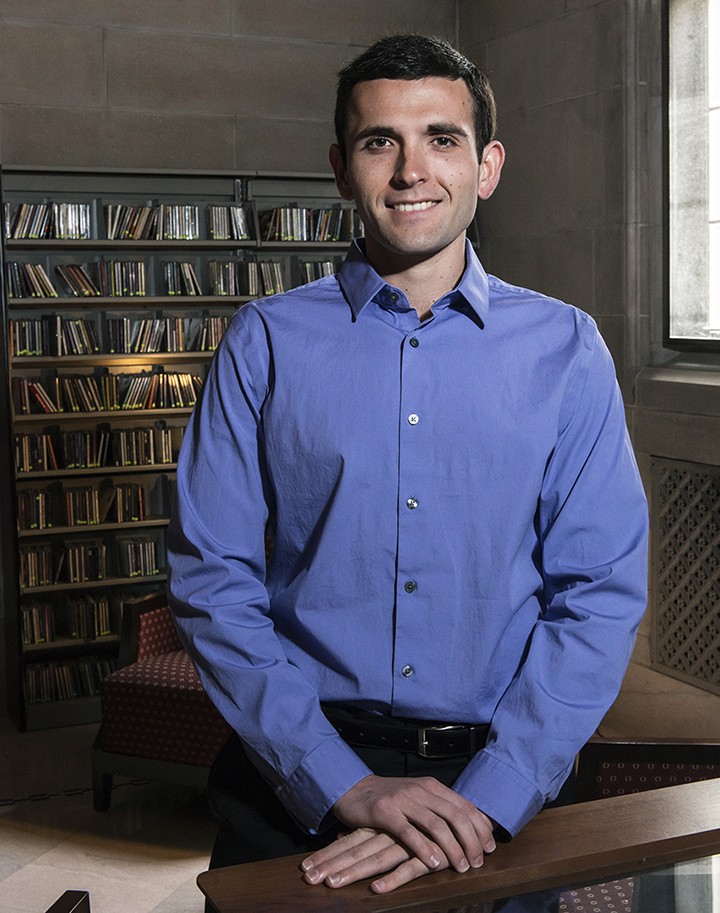HOMETOWN: Coral Springs, Fla.
MAJOR: Physics, minor in chemistry
NOTABLE ACTIVITIES/ACHIEVEMENTS: 2015 Barry M. Goldwater Scholarship; 2015 Benjamin A. Gilman International Scholarship; General Chemistry Achievement Award; Society of Physics Students member; volunteer, Brigham & Women’s Hospital; Dean’s Scholar; Phi Beta Kappa, Sigma Pi Sigma (Physics) and Alpha Sigma Nu (Jesuit) honor societies.
POST-GRADUATION PLANS: M.D. program at Albert Einstein College of Medicine, Bronx, N.Y.
OVERVIEW: Brogan’s interests lie at the intersection of science and medicine, where the problem-solving challenges of research meet the privilege of caring for people. He found a home in the lab of Professor of Chemistry Paul Davidovits, where he estimates he spent more than 2,000 hours conducting experiments with atmospheric aerosols. After narrowly missing out as a sophomore on a Goldwater Scholarship – the nation’s premier undergraduate award in the sciences – he re-applied and received the prestigious award last year. His Gilman Scholarship allowed him to spend six weeks in Peru, studying Spanish and volunteering in health care settings.
What was the major takeaway from your experiences in Cusco, Peru, last summer?
I’d say it really shook me up. I had never been outside the U.S. before. I went from BC to Cusco, Peru. There were stray dogs, air pollution, and long lines at hospitals that were incredibly unsanitary. I stood in on an operation where the window to the operating room was wide open. It really changed my view on the world and reinforced my desire to work with under-served populations as I pursue my medical degree.

You estimate you spent more than 2,000 hours doing research in the Davidovits lab. What motivated you?
I love the challenge of figuring things out. That’s science. Professor Davidovits and his former postdoctoral associate Andrew Lambe taught me a lot about how to hold myself as a researcher. Andrew set an example for enjoying what you do. Working with somebody like that for two years was just an invaluable experience. He was always a positive mentor to me and was there to help me if something didn’t go well.
What kind of influence did Davidovits have on you?
He has always been there for me and everybody else in the lab. Day-to-day, he is very casual. He asks us to call him Paul, but I call him Professor Davidovits. Sometimes he comes in and asks us a question to start a conversation. Or he tells us a story. It could be about the history of a particular phrase, or the reason stone walls surround farms in New England. The beauty of his lab is you don’t feel like you have someone watching over your shoulder. He trusted us to make our decisions and carry out our work.
Which other professors made an impact on you?
David McFadden and Mary Roberts in Chemistry. Andrzej Herczynski [Physics] is the most influential professor I have had from the perspective of the classroom. As an educator, his courses are among the most rigorous I’ve taken at the University. I knew I was going to learn everything an undergraduate would want to know about the class topic. Outside of class, he is available to talk to students, to help them discern what they really want.
How did your studies at BC prepare you for the future?
The coursework at BC is very rigorous, in particular the core curriculum, which really made me step out of my comfort zone and learn how to apply myself to a full range of courses in the liberal arts. Coming into BC, I would say I was weak in the humanities. But the core and the rigor of the education as a whole have strengthened me and taught me how to work through the hard stuff. I think getting through that has made me a better person, a more well-rounded person.
What advice would you give to incoming freshmen?
I got this advice from Associate Professor of Mathematics C-K Cheung when he was my freshman advisor. He said I should try to find a good core group of friends and professors. Try to befriend at least one professor a semester. So I would say get to know faculty at BC. It definitely helped me clarify my long-term goals and how to get there.
When you look back on your four years, what do you think?
I got everything out of BC that I could. It has been the best experience for me, both academically and socially. If I hadn’t come to Boston College, I would be a different person today. These are the things that make it even harder to leave BC.
—Ed Hayward | News & Public Affairs




